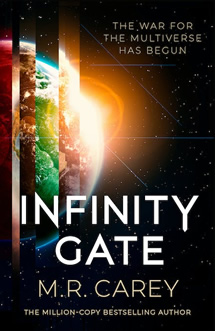Reviewed by Robert Goodman.
By MR Carey, Hachette, $34.99.
 MR Carey is determined to make a splash in every popular speculative fiction sub genre. He started with zombies (The Girl with All the Gifts), tried ghost stories (Fellside and Someone Like Me) and most recently delivered a post-apocalyptic road trip trilogy (Book of Koli series). But there is probably nothing more zeitgeisty than the multiverse and with Infinity Gate, the first in his Pandominion series, Carey takes this idea on in style.
MR Carey is determined to make a splash in every popular speculative fiction sub genre. He started with zombies (The Girl with All the Gifts), tried ghost stories (Fellside and Someone Like Me) and most recently delivered a post-apocalyptic road trip trilogy (Book of Koli series). But there is probably nothing more zeitgeisty than the multiverse and with Infinity Gate, the first in his Pandominion series, Carey takes this idea on in style.
Carey’s multiverse is purely Earth based. That is, it presents an infinity of different versions of our own planet containing all of the multitude of different evolutionary paths that might have been taken. Inhabitants of these realities (known as ‘selves’ because they are all not necessarily human), can “step” between different realities. The whole endeavour is known as the Pandominion and is rigorously controlled by a multidimensional bureaucracy and military force. This fundamental idea is not necessarily unique and those who are familiar with Terry Pratchett and Stephen Baxter’s Long Earth series will probably recognise the term “stepping” for movement between universes so it can only be assumed use of this terminology is a homage.
Much like the Book of Koli series, Infinity Gate is narrated from a time far in the future of its action. The narrator opens by flagging the three characters who will form the centre of the tale and then drops in from time to time to foreshadow or contextualise the things they are doing. The first of these characters is Nigerian scientist Hadiz Tambuwal who, as the Earth dies around her, and with the help of a powerful artificial intelligence finds a way to Step to alternate Earths. In an alternative Lagos she meets Essien Nkanika, a survivor who sees her as an easy mark. Neither of them live in a reality that is part of the Pandominion but they quickly come to its attention. Only, despite the threat they think she might present, the Pandominion does not have too much time to spare on Hadiz as it soon finds itself at war with a machine intelligence which dominates its own part of the multiverse. Unwittingly drawn into the middle of all of this is Topaz Tourmaline FiveHills, a sentient rabbit ‘self’ from a reality in which that species became dominant on Earth.
Infinity Gate spends much of its time on set up, with a little technobabble early on that many readers are likely to breeze over, establishing Hadiz, Essien and Topaz as well as some of their antagonists and allies. A niggle with the narrated-from-the-future approach (seen also in the Koli series) is that it can tend to fall too easily into an expository style. But it allows Carey to take time to establish and contextualise the universe in which they live, and ensure readers focus on the details that will matter. And as Carey showed in the Koli books, the set-up is worth the pay off as the second half of the book accelerates through to a twisty, cliffhanger-filled finale. Despite all of this action, there is still the feeling that the whole narrative is essentially prologue for what is expected to be a concluding volume (The Pandominion is being touted as a duology). Carey has shown that he is able to make that prologue count when it matters.
Interestingly much of the action is set in Lagos or alternative versions of the city, and two of the main characters are Nigerian. This setting and its people are vividly brought to life by Carey. In his acknowledgments Carey thanks fellow science fiction author Tade Thomspson (whose excellent Wormwood series is also set in central Africa) for helping him get those scenes right.
Carey, who also has plenty of experience in the Marvel and DC comic universes, knows how to tell a rattling good yarn. And while he does not do too much new conceptually here, just by delivering a new set of interesting characters in a new universe, gives him room to flex and enjoy himself. With Infinity Gate Carey plugs into one of the hottest sub-genres in science fiction and delivers a great way to scratch the multiverse itch.
Over 900 more book reviews can be found on Pile by the Bed.











